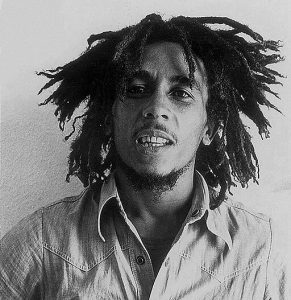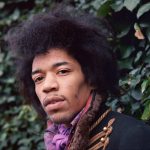
Dennis Morris; Distributed by Island Records, Public domain, via Wikimedia Commons
Stage Name: Bob Marley
Birth Name: Robert Nesta Marley
Place of Birth: Nine Mile, Saint Ann Parish, Jamaica.
Date of Birth: February 6, 1945
Died: May 11, 1981 (36 years)
Years Lived: 1945 - 1981
Genres: Reggae, Rocksteady, Ska, Soul
Early Life and Background
Birth and Family
Robert Nesta Marley, widely known as Bob Marley, was born on February 6, 1945, in Nine Mile, Saint Ann Parish, Jamaica. He was the son of Cedella Booker, a 18-year-old African-Jamaican, and Norval Sinclair Marley, a 50-year-old white Jamaican of English descent. Bob Marley had several siblings from both his mother and father’s side.
Childhood
Bob Marley grew up in a rural Jamaican community, where he faced economic hardships and social challenges. Despite these difficulties, he developed a deep interest in music from an early age. His childhood was marked by a strong connection to his Rastafarian faith and culture, which would later become a central theme in his music.
Education
Marley attended the local Stepney Primary School and later moved to Kingston, where he attended the W. E. W. Smith High School. His formal education was limited, but he was deeply immersed in the vibrant music scene of Jamaica. His early exposure to music came from listening to American rhythm and blues and Jamaican ska, which influenced his musical style.
Musical Beginnings
First Encounters with Music
Bob Marley’s first significant foray into music began in the early 1960s. He started his musical career performing in local clubs and recording with producer Coxsone Dodd at Studio One. His early recordings were in the ska and rocksteady genres, which were popular in Jamaica at the time.
Early Bands or Groups
In 1963, Marley formed the group The Wailers with Neville “Bunny” Livingston (later known as Bunny Wailer) and Peter Tosh. The Wailers initially gained recognition with their ska and rocksteady recordings. The band’s early gigs included performances at local Jamaican venues and eventually led to their first recording sessions.
Career Breakthrough
Discovery
Bob Marley and The Wailers gained international attention after their move to London in 1971. Their music was discovered by Chris Blackwell, the founder of Island Records, who signed them to his label. Blackwell’s support was instrumental in introducing Marley to a global audience.
Debut Release
The Wailers’ debut album under Island Records, Catch a Fire (1973), marked a significant turning point in Marley’s career. The album featured songs like “Concrete Jungle” and “Catch a Fire,” which introduced Marley’s reggae sound to the international market and laid the foundation for his global success.
Significant Performances
One of the most significant performances in Bob Marley’s career was the “One Love Peace Concert” in 1978, which aimed to promote peace in Jamaica during a period of political violence. Additionally, his performances at the Lyceum Theatre in London in 1975 and the U.S. tour in 1976 helped solidify his reputation as an influential artist.
Rise to Fame
Major Albums and Hits
Bob Marley’s rise to fame was marked by the release of several influential albums. Rastaman Vibration (1976) and Exodus (1977) featured major hits such as “No Woman, No Cry,” “Jamming,” and “One Love.” His 1979 album Survival included tracks like “Zimbabwe” and “Africa Unite,” which highlighted his political and social activism.
Awards and Recognition
Throughout his career, Bob Marley received numerous accolades and recognition for his contributions to music. He was posthumously awarded the Grammy Lifetime Achievement Award in 2001. His music has been celebrated for its social and political messages, and he remains an iconic figure in reggae music.
Collaborations
Bob Marley collaborated with various artists and producers, including his Wailers bandmates, such as Peter Tosh and Bunny Wailer. His work with producer Lee “Scratch” Perry was crucial in shaping his sound, particularly on albums like Soul Revolution (1971) and Rastaman Vibration (1976).
Personal Life
Relationships
Bob Marley’s personal life was marked by his relationships with several women and his large family. He was married to Rita Marley, and together they had several children. Marley fathered additional children with other women, including prominent figures like Lauryn Hill and Ziggy Marley.
Challenges
Marley’s life was marked by several challenges, including struggles with political and social unrest in Jamaica. He faced health issues throughout his later years, including a diagnosis of melanoma in 1977, which eventually led to his death. His life and career were also marred by controversy and political tensions.
Philanthropy
Bob Marley was actively involved in charitable work and social causes. He supported various initiatives related to peace, human rights, and African liberation. His music and activism were often focused on promoting unity and social justice, reflecting his commitment to these causes.
Musical Style and Influence
Genre and Style
Bob Marley’s music is primarily categorized as reggae, but his style also incorporates elements of ska, rocksteady, and soul. His sound is characterized by its rhythmic grooves, socially conscious lyrics, and use of Rastafarian themes. His distinctive voice and innovative approach to songwriting set him apart as a leading figure in reggae music.
Influences
Marley’s music was influenced by a range of genres and artists, including American rhythm and blues, ska, and rocksteady. He was also influenced by Rastafarianism, which shaped his lyrical content and spiritual outlook. His experiences growing up in Jamaica and exposure to local music styles were fundamental in developing his unique sound.
Impact on Music
Bob Marley is widely regarded as one of the most influential musicians in the history of reggae. His music played a key role in popularizing reggae outside of Jamaica and bringing attention to Rastafarian culture. His songs continue to inspire and influence artists across various genres and remain popular worldwide.
Later Career and Legacy
Continued Success
In the latter part of his career, Bob Marley continued to release successful albums and perform globally. His music and message reached new audiences, and his influence continued to grow. Albums like Uprising (1980) and the posthumous compilation Legend (1984) solidified his legacy.
Retirement or Passing
Bob Marley’s career was cut short when he died on May 11, 1981, in Miami, Florida, due to complications from melanoma. His death was a significant loss to the music world and his fans, marking the end of a remarkable career.
Posthumous Releases and Tributes
Marley’s music has been celebrated through numerous posthumous releases and tributes. Albums such as Confrontation (1983) and Rebel Music (1995) have been released posthumously. His legacy is honored through various memorials, including the Bob Marley Museum in Kingston, Jamaica, and annual celebrations of his life and work.
Discography
Albums:
- Catch a Fire (1973) – Island Records
- Rastaman Vibration (1976) – Island Records
- Exodus (1977) – Island Records
- Survival (1979) – Island Records
- Uprising (1980) – Island Records
- Confrontation (1983) – Island Records (posthumous)
- Legend (1984) – Island Records (posthumous)
Singles:
- “No Woman, No Cry” (1974) – Billboard Hot 100: #32
- “One Love” (1965) – Billboard Hot 100: #5
- “Jamming” (1977) – Billboard Hot 100: #9
- “Redemption Song” (1980) – Billboard Hot 100: #43
- “Could You Be Loved” (1980) – Billboard Hot 100: #6
Collaborations:
- Soul Revolution (1971) – with The Wailers
- The Best of The Wailers (1971) – with The Wailers
- Rastaman Vibration (1976) – with The Wailers
Conclusion
Summary of Impact
Bob Marley is celebrated for his profound impact on reggae music and his role in promoting Rastafarian culture globally. His music, characterized by its spiritual and social messages, continues to resonate with audiences and inspire artists across genres.
Legacy
Bob Marley’s legacy endures through his influential music, his contributions to reggae and Rastafarian culture, and his ongoing impact on social and political issues. He is remembered as a pioneering artist who used his platform to advocate for peace and unity. His life and work are honored through various tributes and celebrations worldwide.
















Leave a Reply